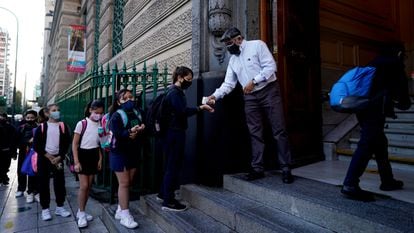Students from Buenos Aires line up to have their temperature taken before entering school.Victor R. Caivano / AP
For the first time in 521 days, the elementary students of the city of Buenos Aires returned to share the classrooms this Tuesday.
At the beginning of August, the high school students had met again and the next one will be the turn of the little ones.
The return to the new normal of some 290,000 students in the capital of Argentina occurs amid a progressive decline in infections and deaths from covid-19 and less than a month before the primary elections.
More information
Depression, sleeping and eating disorders among Argentine minors due to isolation
The political fight for education plunges the schools of Buenos Aires into uncertainty
At the entrance of the schools, some children doubted between bumping their knuckles or hugging classmates they had not seen since March 20, 2020, when the Argentine president, Alberto Fernández, ordered the suspension of face-to-face classes before the appearance of the first cases of coronavirus in the country.
Except for a few rural schools, no student from Argentina returned to the classroom that year and their education continued, with great inequalities, virtually.
Face-to-face teaching began to recover in the 2021 school year, each province at a different pace and with strong debates inside and outside the schools. In Buenos Aires, governed by the opposition mayor Horacio Rodríguez Larreta, face-to-face classes on reduced hours were maintained even when the second wave began, in April, and Fernández had ordered that students return to study from home. Rodríguez Larreta's decision, backed by a court ruling, divided the educational community between those who defended the need for children to attend classrooms - in line with the Buenos Aires government - and those who warned that contagions would increase at a time when that the health system was close to collapse - as was the national government.
Unlike then, the return to "full presence" launched this month has in its favor the health situation and the approval of all political forces. This Monday, 3,636 new cases and 64 deaths were confirmed throughout the country, the lowest number of deaths and infections since the start of the second wave, four months ago. In Buenos Aires, there was a single deceased resident and 329 new infections. The occupancy of beds in intensive care units in the public health system, which exceeded 80% at the worst moment of the pandemic, is today 21.5%.
The vaccination campaign has contributed to the improvement of the health outlook —almost 60% of the population of Argentina has received one dose and 22.7% both—, but the authorities fear the effect that the expansion of the variant could have. delta.
With the country closed to foreign tourism and with great restrictions and controls also for trips abroad by nationals and residents, the new, more contagious variant does not currently have community circulation in the country.
Join EL PAÍS now to follow all the news and read without limits
Subscribe here
Despite the recovery of the schedule and the size of the groups, the schools have changed. Students must remain in a mask at all times, except during breakfast and lunch hours. Their temperature is taken upon entering the school and their hands are sprayed with alcohol diluted in water. At recess, games involving physical contact between children are still prohibited. Psychologists warn of the serious impact of the pandemic on new generations, not only in the short term - with sleeping and eating disorders, among many others - but also in the long term.
In the Argentine capital, the last educational step that is missing to join the new normal is the university, which is maintained for now virtually.
In other provinces, however, the situation varies.
Some had already advanced to full presence, while others, such as the province of Buenos Aires and partially in that of Córdoba, maintain a mixed system with face-to-face and online classes.
Subscribe here to the EL PAÍS América newsletter and receive all the informative keys of the current situation in the region.

